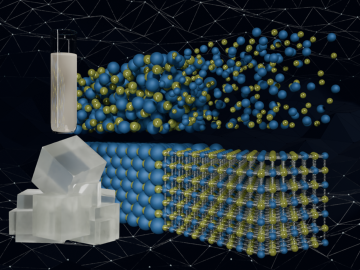
Filter News
Area of Research
- Advanced Manufacturing (8)
- Biology and Environment (36)
- Computational Biology (1)
- Computational Engineering (2)
- Computer Science (6)
- Electricity and Smart Grid (1)
- Energy Science (84)
- Functional Materials for Energy (2)
- Fusion and Fission (9)
- Fusion Energy (7)
- Isotopes (7)
- Materials (64)
- Materials Characterization (2)
- Materials for Computing (12)
- Materials Under Extremes (1)
- Mathematics (1)
- National Security (8)
- Neutron Science (34)
- Nuclear Science and Technology (7)
- Quantum information Science (1)
- Supercomputing (25)
- Transportation Systems (2)
News Type
News Topics
- (-) Artificial Intelligence (33)
- (-) Biomedical (18)
- (-) Composites (16)
- (-) Cybersecurity (9)
- (-) Environment (67)
- (-) Fusion (19)
- (-) Isotopes (15)
- (-) Materials (70)
- (-) Neutron Science (42)
- (-) Physics (11)
- (-) Polymers (15)
- (-) Security (4)
- (-) Transportation (52)
- 3-D Printing/Advanced Manufacturing (57)
- Advanced Reactors (18)
- Big Data (26)
- Bioenergy (26)
- Biology (31)
- Biotechnology (6)
- Buildings (31)
- Chemical Sciences (31)
- Clean Water (14)
- Computer Science (70)
- Coronavirus (15)
- Critical Materials (13)
- Emergency (2)
- Energy Storage (50)
- Exascale Computing (11)
- Fossil Energy (1)
- Frontier (10)
- Grid (28)
- High-Performance Computing (33)
- Hydropower (6)
- Irradiation (3)
- ITER (5)
- Machine Learning (19)
- Materials Science (54)
- Mathematics (3)
- Mercury (3)
- Microscopy (21)
- Molten Salt (6)
- Nanotechnology (25)
- National Security (13)
- Nuclear Energy (36)
- Partnerships (11)
- Quantum Computing (9)
- Quantum Science (17)
- Simulation (16)
- Software (1)
- Space Exploration (11)
- Statistics (1)
- Summit (11)
Media Contacts

Scientists have developed a new machine learning approach that accurately predicted critical and difficult-to-compute properties of molten salts, materials with diverse nuclear energy applications.

Researchers at ORNL have developed a tool that gives builders a quick way to measure, correct and certify level foundations. FLAT, or the Flat and Level Analysis Tool, examines a 360-degree laser scan of a construction site using ORNL-developed segmentation algorithms and machine learning to locate uneven areas on a concrete slab.

Scientists at ORNL have developed a vacuum-assisted extrusion method that reduces internal porosity by up to 75% in large-scale 3D-printed polymer parts. This new technique addresses the critical issue of porosity in large-scale prints but also paves the way for stronger composites.

Research teams at the Department of Energy’s Oak Ridge National Laboratory received computing resource awards to train and test AI foundation models for science. A total of six ORNL projects were awarded allocations from the National Artificial Intelligence Research Resource, or NAIRR, pilot and the Innovative and Novel Computational Impact on Theory and Experiment, or INCITE, program to train their AI models.
Mariam Kiran, a quantum research scientist at the Department of Energy’s Oak Ridge National Laboratory, was recently honored as a finalist at the British Council’s Study U.K. Alumni Awards 2025, which celebrate the achievements of U.K. alumni worldwide.
Daniel Jacobson, distinguished research scientist in the Biosciences Division at ORNL, has been elected a Fellow of the American Institute for Medical and Biological Engineering, or AIMBE, for his achievements in computational biology.

Neus Domingo Marimon, leader of the Functional Atomic Force Microscopy group at the Center for Nanophase Materials Sciences of ORNL, has been elevated to senior member of the Institute of Electrical and Electronics Engineers.
Massimiliano (Max) Lupo Pasini, an R&D data scientist from ORNL, was awarded the National Energy Research Scientific Computing Center’s High Performance Computing Achievement Award for High Impact Scientific Achievement for his work in “Groundbreaking contributions to scientific machine learning, particularly through the development of HydraGNN.”

Melissa Cregger of the Department of Energy’s Oak Ridge National Laboratory has received the Presidential Early Career Award for Science and Engineers, or PECASE, the highest honor bestowed by the U.S. government on outstanding early-career scientists and engineers.


